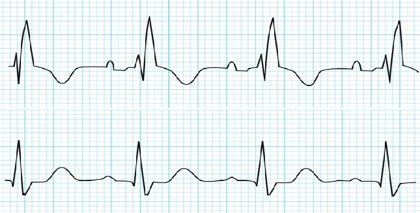What block is signified by a prolonged P-R interval?
1st degree block
What drip do we start for a patient in Afib with RVR?
AMIODARONE!
What is our potassium goal for our cardiac patients?
4.0
What are the 3 types of temporary pacing?
Transcutaneous
Transvenous
Epicardial
What are shockable rhythms?
VFib
VTach
SVT
Afib RVR
Longer, Longer, Longer Drop that's what we call a .....?
Wenckebach
What are the concentrations of standard Levo and Epi?
Levo: 8 mg/250 mL
Epi: 7.5 mg/250 mL
List 3 treatment methods for hyperkalemia
Regular insulin
dextrose infusion
calcium
albuterol
kayexalate
What kind of patients need temporary pacing? (Name 3)
Brady-arrhythmias
AV conduction blocks
junctional rhythms
ectopy suppresion
PPM malfunction
electrolytes or medication induced
Interpret this ABG:
pH: 7.36
pCO2: 49
HCO3: 28
pO2: 82
Compensated respiratory acidosis

What rhythm is this?
Junctional tachycardia
What is a side effect of milrinone that could cause a provider to switch to a different inotrope?
Hypotension
How do we correct hyponatremia in heart failure patients?
fluid restriction and diuretics
What phenomenon can happen if pacing occurs on a T wave?
R-on-T phenomenon
You are working with an impella patient and, being the good nurse you are, you walked your patient around the unit. Upon returning to the room, the patient complains of feeling short of breath. You look at the monitor and notice afib rvr in the 170's with a bp of 80/52. The provider wants to cardiovert the patient. What button must you press on the defibrillator prior to shocking the patient?
SYNC
Name 3 medications that can cause a prolonged QT interval
Amiodarone
haldol
seroquel
cipro/levofloxacin
erythromycin
procainamide
sertraline
How do you manage your patient if they have an allergic reaction to Thymoglobulin?
Manage the symptoms but do NOT stop the drip
What electrolyte should you check after administering multiple transfusions?
Calcium (ionized calcium)
How do we see a patient's intrinsic activity while they are being paced?
walk it dowwwwnnnnn
You are caring for a patient who was recently extubated to bipap. The patient is tachypneic breathing 35 breaths/min. You draw an ABG and results are as shown:
pH: 7.29 pCO2: 50 HCO3: 21 SPO2: 88%
After obtaining the ABG results, you notice your patient's respiratory rate has decreased to 16 breaths/min.
What should you anticipate for this patient?
Imminent respiratory demise.... INTUBATE
What block is this?

Right bundle branch block
What medication can we use to treat methemoglobinemia (the inability of blood to carry oxygen)?
Methylene Blue
What electrolyte deficiency has these symptoms?
Confusion/agitation
Positive (+) Chvostek and Trousseau signs
Wide QRS complex -> ventricular arrhythmias
Magnesium (hypomagnesemia)
What form of pacing failure is this?

Failure to sense
You are caring for a 68-year-old heart failure patient with a swan in place. You obtain your morning FICK and conveniently your provider wedged the swan so you can have an accurate wedge pressure. Your CI is 2.2 and SVR is 1800. The patient's diuretics are increased. Several hours later, your patient starts complaining of severe chest pain and has started coughing up bright red blood. The blood pressure is 65/43. The provider immediately comes to bedside and calls for a CT surgeon stat.
What is wrong with your patient?
Pulmonary artery rupture due to an inflated swan balloon